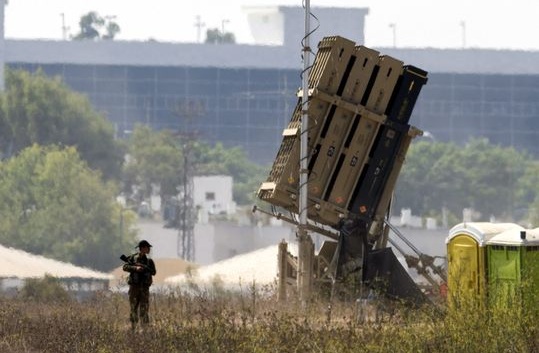On September 14, 2016, the United States and Israel signed a "memorandum of understanding" (MOU) pledging $38 billion in "security assistance" to Israel over ten years. The agreement replaces a similar MOU signed by the Bush administration. However, the Obama administration claimed two key differences on its MOU web page. First, Israel is not allowed to lobby Congress for hundreds of millions in additional funds from its embassy and US affinity organizations. Second, more of the ten-year allotment must be spent on US military contractors rather than inside Israel. However, "escape clauses" in the written agreement – which the White House never released – make such limitations unlikely. Most worrying, the MOU dangles Israel a blank check if it launches war on its neighbors, while continuing to provide the IDF with the free food and fuel it would need to sustain such a conflict.
|
MOU spending in Israel vs US if “escape clauses” |
|||||
|
Fiscal Year |
Israel |
US |
Total |
Israel % |
US % |
|
2019 |
$1,315.3 |
$2,484.7 |
$3,800.0 |
35% |
65% |
|
2020 |
$1,305.3 |
$2,494.7 |
$3,800.0 |
34% |
66% |
|
2021 |
$1,295.3 |
$2,504.7 |
$3,800.0 |
34% |
66% |
|
2022 |
$1,285.3 |
$2,514.7 |
$3,800.0 |
34% |
66% |
|
2023 |
$1,275.3 |
$2,524.7 |
$3,800.0 |
34% |
66% |
|
2024 |
$1,225.3 |
$2,574.7 |
$3,800.0 |
32% |
68% |
|
2025 |
$950.3 |
$2,849.7 |
$3,800.0 |
25% |
75% |
|
2026 |
$750.3 |
$3,049.7 |
$3,800.0 |
20% |
80% |
|
2027 |
$750.3 |
$3,049.7 |
$3,800.0 |
20% |
80% |
|
2028 |
$500.0 |
$3,300.0 |
$3,800.0 |
13% |
87% |
|
Total |
$10,652.7 |
$27,347.3 |
$38,000.0 |
28% |
72% |
On December 22, 2016 the Office of the Legal Advisor of the US Department of State released the MOU (PDF) under a Freedom of Information Act request and pressure from a lawsuit challenging the legality of the aid. Detailed annual aid schedules and escape clauses within the MOU appear to refute claims that more of the package must absolutely be spent in the United States, in contrast to a September White House announcement:
"Off shore Procurement (the arrangement under the current MOU through which Israel has been uniquely permitted to spend 26.3 percent of its annual FMF package within Israel on non-U.S. products) and Israel’s use of FMF funds to purchase fuel – means that Israel will spend more funding, as much as $1.2 billion per year, on the advanced military capabilities that only the United States can provide. The acquisition of additional U.S.-produced capabilities and technology provide the best means to ensure Israel preserves its Qualitative Military Edge (QME)."
The Obama administration cites the discontinuance of "anomalies" such as aid funding Israel’s export-driven arms industry and facilitating Israeli purchases of US commodities, rather than high-tech US military hardware. However, under the new MOU, up to 28% of total funds could be spent in Israel over the life of the agreement. That is because Israel could insist on receiving 100% of missile defense funds – rather than the recommended 50% – in "production memoranda of agreement" for such systems. Further, if only $1.2 billion per year are spent on "advanced military capabilities" from the US as mentioned in the MOU, it would allow Israel’s "purchases" of low value-added US commodities, such as food and fuel, to be $1.2-2.1 billion per year. Put another way, Israel could "gear up" for military conflicts by spending 52-64% of its "aid" allocation sourced from the US on food for the IDF and fuel for ground vehicles and aircraft. Whether US military contractors, which have inconsequential direct Israel revenues, even receive the $1.2 billion is in doubt, because the MOU is silent whether US based subsidiaries of Israeli military contractors, such as IAI North America and Elbit Systems of America, count as "Israeli" or "US" vendors.
That MOU, like its predecessor, continues to permit lavish subsidies for basic supplies – food and fuel – core to the offensive needs of the IDF, rather than the purely high-tech "defensive" infrastructure touted by the White House, is troubling. At its worst, the MOU could incentivize Israel to engage in offensive war, in order to be permitted to lobby congress for funding framed as "key to its survival." In the MOU, Israel pledges not to seek additional funding "except in exceptional circumstances…such as in the event of a major armed conflict involving Israel." The MOU is silent on whether Israel is allowed to seek addition funding if it is clearly the aggressor. The only requirement is that it is "jointly agreed by the US administration and Israel" that there are indeed "exceptional circumstances" that demand MOU limits be broken. In the decades spanning Israel’s existence since 1948, military conflicts have been much more the rule than exception.



























